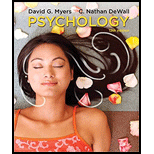
Concept introduction: Behavior is the capacity of an organism to learn through experience. Learning theories focus on the interactions between the personal, behavioral, and environmental factors that determine the behavior. This is used to describe the process and retain the knowledge.
Answer to Problem 1MM
Correct answer: Learning is defined as “the process of acquiring knowledge through new experiences and relatively enduring information or behaviors.”
Explanation of Solution
The process of gaining information and behaviors through experience is called learning. Humans, animals and even some machines have the capability to learn. Human learning starts before birth and continues till the end of their lifetime; many interactions are with the environment. If a response is associated with a particular stimulus, then it is called associative learning. Associative learning is facilitated by conditioning. The two main forms of conditioning are classical and operant conditioning. Classical conditioning is the involuntary response from the stimulus. The voluntary responses that are adapted by the environmental consequences that obtain benefits to the organism are collectively called operant conditioning. The important elements of learning process involve attention and focus, associations, emotions, and spaced repetitions. Thus, these elements influence the learning process that enhances knowledge and behavior.
Want to see more full solutions like this?
Chapter 20 Solutions
Psychology in Modules
- Identify applicable scenarios and examples observed ‘in action’ during your class behavior. Provide an analysis of psychological theory, themes, and concepts evident in the work observed during class. What theoretical framework is used to understand/explain what occurred in your experiences?arrow_forwardwhat makes the candomble tradition stand out?arrow_forwardby observing behavior students in class , what your thoughts about the effectiveness and purpose of the work being done there?arrow_forward
- When would using checklists and rating scales be most appropriate in early childhood? Use scholarly sources.arrow_forwardI need help with two articles are there any similarities and differences between the two https://www.phnompenhpost.com/business/indian-ambassador-pledges-increased-trade-tourismpromotion, https://time.com/5486460/pol-pot-cambodia-1979/arrow_forwardEvaluate the application of behaviourism and cognitive psychological perspectives to contemporary issues in psychology.arrow_forward
- Analyse the similarities and the differences between behaviourism and cogniperspectives in psychology.arrow_forwardEvaluate the work of key theorists Neisser, 1967 relating to congnitive psychological perspectivearrow_forwardEvaluate the work of key theorists John B. Watson and B.F. Skinner relating to behaviourismarrow_forward
 Ciccarelli: Psychology_5 (5th Edition)PsychologyISBN:9780134477961Author:Saundra K. Ciccarelli, J. Noland WhitePublisher:PEARSON
Ciccarelli: Psychology_5 (5th Edition)PsychologyISBN:9780134477961Author:Saundra K. Ciccarelli, J. Noland WhitePublisher:PEARSON Cognitive PsychologyPsychologyISBN:9781337408271Author:Goldstein, E. Bruce.Publisher:Cengage Learning,
Cognitive PsychologyPsychologyISBN:9781337408271Author:Goldstein, E. Bruce.Publisher:Cengage Learning, Introduction to Psychology: Gateways to Mind and ...PsychologyISBN:9781337565691Author:Dennis Coon, John O. Mitterer, Tanya S. MartiniPublisher:Cengage Learning
Introduction to Psychology: Gateways to Mind and ...PsychologyISBN:9781337565691Author:Dennis Coon, John O. Mitterer, Tanya S. MartiniPublisher:Cengage Learning Psychology in Your Life (Second Edition)PsychologyISBN:9780393265156Author:Sarah Grison, Michael GazzanigaPublisher:W. W. Norton & Company
Psychology in Your Life (Second Edition)PsychologyISBN:9780393265156Author:Sarah Grison, Michael GazzanigaPublisher:W. W. Norton & Company Cognitive Psychology: Connecting Mind, Research a...PsychologyISBN:9781285763880Author:E. Bruce GoldsteinPublisher:Cengage Learning
Cognitive Psychology: Connecting Mind, Research a...PsychologyISBN:9781285763880Author:E. Bruce GoldsteinPublisher:Cengage Learning Theories of Personality (MindTap Course List)PsychologyISBN:9781305652958Author:Duane P. Schultz, Sydney Ellen SchultzPublisher:Cengage Learning
Theories of Personality (MindTap Course List)PsychologyISBN:9781305652958Author:Duane P. Schultz, Sydney Ellen SchultzPublisher:Cengage Learning





